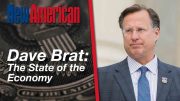
Former President Bill Clinton says Obama’s approach to taming the federal deficit "is a little confusing" and suggests that raising taxes would blockade any efforts to revive the stale U.S. economy. During an interview with Newsmax CEO Christopher Ruddy in New York, where Clinton held the 10th annual meeting of the Clinton Global Initiative, the former President discussed political topics such as climate change, tax policy, and government regulations. He also mentioned the possibility of his wife, Hillary, running for President in 2016, naming her "the ablest person in my generation."
Clinton conceded to Ruddy that he was somewhat baffled with President Obama’s newly-announced tax plan — the "Buffett Rule" — which would raise taxes on individuals earning over $1 million. "In the speech that the president gave to Congress, he didn’t propose any new taxes. The speech was $250 billion in tax cuts, $250 billion in spending over a period of two to three years. It focused mostly on a rather innovative set of payroll tax cuts and incentives to hire people," Clinton asserted.
Until the economy shows signs of sustainable growth, the former President said raising taxes or boosting spending are not viable solutions to reviving the economy and tempering the relentlessly high unemployment rate. "I personally don’t believe we ought to be raising taxes or cutting spending until we get this economy off the ground. If we cut government spending, which I normally would be very inclined to do when the deficit’s this big, with interest rates already near zero, you can’t get the benefits out of it," Clinton said. "So what I’d like to see them do is come up with a bipartisan approach, starting with the payroll tax cuts because they have the biggest return."
During the interview, Clinton described the burdening economic consequences of financial dormancy in the private sector: "There are two big chunks of money in this country, untouched corporate treasuries and banks. Companies have $2 trillion but they’re not investing it. Banks have $2 trillion but they’re not investing it." Clinton suggested that one way to get private money flowing again is to recede the burdensome chains of new regulations, as they tie down the financial arms of business owners — which prevents new hiring and dismisses plans for expansion.
House Majority Leader Eric Cantor (R-Va.) hailed Clinton’s opposition to Obama’s new tax plan, saying, "President Clinton is right, now is not the time to raise taxes and we ought to be working together to produce results and get people working again." In a statement Wednesday afternoon, Cantor said he hopes Obama "will heed the advice of President Clinton and drop his demand for one of the largest tax increases in American History."
But Clinton’s remarks during the Newsmax interview are somewhat of a retreat from some comments he made earlier this week. On NBC’s "Today Show" Monday he railed at Republicans for incessantly arguing with the President over tax increases on the wealthy. "The Republicans in Washington always say the same thing," he said, scrutinizing the GOP for opposing an end to the Bush-era tax cuts. "It’s an insult to those people … They don’t mind being asked to pay their fair share."
On another note, Obama has recently received mounting pressure from Democrats and prominent liberal voices to renounce a second presidential term, as the President’s approval numbers continue to plummet. Many on the left are concerned that Obama has moved too quickly, revealing too much of their big-government agenda. Indeed, the President has lost confidence from many liberals and moderate Democrats, and some fear that unless the DNC finds a new candidate, they might lose the executive to one of the many GOP candidates now in the presidential race.
If Obama were to step down — though many suggest this is highly unlikely — a new Democratic candidate would naturally emerge. Over the past couple years, Mrs. Clinton has attained stature on diplomatic and international fronts, which may prove favorable for Democrats who are concerned with Obama’s questionable foreign policies. And with so many Americans discontented with Obama’s handling of the U.S. economy, maybe an opposing view from a renowned political figure may stir the 2012 Democratic election pot.
Photo: President Bill Clinton listens to Michel Martelly, President of the Republic of Haiti, during the Clinton Global Initiative, Sept. 19, 2011 in New York: AP Images



